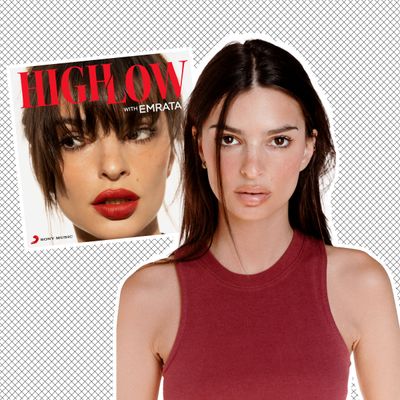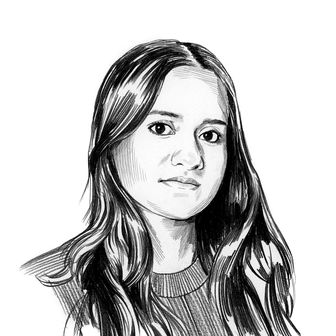
Until further notice, Emily Ratajkowski is in her “Bitch Era.” If the model-writer has popped up on your “For You” page in recent months, a candid and knowledgeable parasocial friend, you already know that on TikTok, Ratajkowski dishes out her hot takes on toxic men, the hive-mind shaming of women involved in cheating scandals with powerful men, and the perennial fetishization of female pain, whether that be in films like Blonde or in real life. “I was thinking about it, and you know what’s kind of hard to fetishize? Anger,” she says in a recent video. “So I have a proposal. I think we all need to be a little more pissed off … I think we should all be in our Bitch Era.”
Thankfully for us, Ratajkowski is also entering her podcast era. The My Body author has partnered with Sony Music Entertainment to launch High Low With EmRata, a part-monologue, part-interview podcast series; twice a week, it will explore everything from philosophy, politics, and feminism to sex, pop culture, and TikTok. In a bonus third episode, Ratajkowski will engage with comments from listeners — she finds it essential to wade into the pushback. “Books are amazing because you create this thing that’s yours, but people go and buy a copy and it becomes theirs. The relationship between writer and reader is cool, but it’s definitely not as much of a conversation as you can have online, in the discourse that’s constantly happening on Twitter and TikTok,” she tells the Cut. “Podcasting is somewhere in between. I like the idea of having a conversation and a community in the way that you can’t have in a book.”
A lifelong podcast fan who grew up listening to NPR and “This American Life” while driving from her native San Diego to L.A. as a teenager, Ratajkowski is excited to take on the mantle of hosting her own show. High Low listeners can expect to hear relationship advice (“I’m a single mom,” she tells the Cut, alluding to her very public divorce), personal anecdotes, and, per Ratajkowski, at least one episode delving into feminism and plastic surgery. No topic is too small: “I’ve been interested intellectually in the idea of approaching lowbrow topics in a sophisticated way or marrying the two. It’s not only who I am but how my brain works. I have a bikini business and a book of essays.” The Cut spoke to Ratajkowski about what else we can anticipate from her podcast, fielding frustrating Me Too questions, and whether her son and Julia Fox’s will have a BYOB (bring your own brooms, to be clear) playdate anytime soon.
You’ve written essays, and on TikTok you share advice like a candid, knowledgeable friend. What inspired you to get into the medium of podcasting?
For years, people have been telling me I should start a podcast. It was one of those things where I was like, Everyone has a podcast. But I have a specific point of view that I’m not sure the world knows that well. Once I decided I was publishing my book, I knew I wanted to start a podcast. Through the book, I felt like people were going to understand me, my politics, and who I am. But something about speaking directly to people has always appealed to me.
I grew up listening to NPR. My parents didn’t have a TV at home, so we listened to lots of radio. I lived in San Diego and worked in L.A. as a teenager and drove myself there all the time. I got tired if I listened to music, so I basically listened to “This American Life” and “Fresh Air” and all that sort of stuff — podcasts before they were podcasts.
As a lifelong podcast fan, what has it been like working on one of your own? Who can we expect in terms of guests?
I can’t talk about guests because celebrity booking is a wild process. I don’t want to give names and then jinx it, but as far as topics, I’m naturally driven to women’s issues and thinking about power. I just recorded an episode about feminism and plastic surgery: Is plastic surgery feminist, or is it the opposite? That’s one example.
Because the podcast is conversations and monologues, they’re kind of two separate things. It’s incredible talking to people; I’m a naturally curious person. That part’s been relatively good, but I’m just starting, so ask me again in six months. The monologue portion has also been exciting. I have ideas that pop into my head that I put in my Notes app, and a lot of those end up in essays or pieces of writing. But a lot of them didn’t because it takes time to flesh out ideas. The monologues are somewhere in between an essay and a TikTok. I’m really enjoying it thus far.
You recently made a video critically addressing the legacy of the Me Too movement, saying it hasn’t changed things and how it’s created men who are more afraid of consequences than men who genuinely care about causing harm. Can you speak more about that, and will you address that on High Low?
My paperback was recently released, and when I’m doing book press, so many people ask me during interviews whether things have changed, both since my experiences inside the industry and also as a child and a young woman. I feel like there’s this expectation on me to just be like, “Yes.” But I just don’t know if I totally feel that way. I do think that there’s a sense of fear around “You better watch your back and be careful of what you say,” but less of an understanding of power dynamics and why it’s important to treat women with respect. It’s scary for me. That’s what I was trying to say in my TikTok: When you teach someone a lesson about life, you don’t want it to be because they’re afraid of getting in trouble; you want it to be because they understand the concept. When I made that video, it was because someone had just asked me that question, and I was like, I’m so sick of this fucking question! I’m going to put out a PSA.
What have you learned about relationships as an adult, and will we hear more advice from you on that front?
I’m a single mom and I’m 31. I’ve learned so much about relationships and marriage. We’re in this interesting moment where there’s all kinds of studies about women postdivorce and their happiness, about heterosexual marriages and how families work. That’s apropos of everything I’m interested in and something I read about, too. I’m actually rereading Adrienne Rich’s Of Woman Born. It’s about work-life-mother balance and how hard and unfair it is. So yes, absolutely.
Tell me how you prepare for a successful Bitch Era in 2022.
It might be longer than 2022, to be honest, because this year’s coming to an end and I have a whole lot of bitchiness to serve up. Generally speaking, I think anger is something all of us have a negative relationship to. At least for me, I associate it with masculinity and toxic masculinity and violence, even. But I think what the world could use is a healthy dose of female anger. It’s interesting with what we’re seeing in the world and what’s happening in Iran right now. Justified rage can be really productive. A lot of good things can come out of anger, and it doesn’t mean violence or toxic masculinity; it can just mean being a bitch. I like that word because it has this negative, derogatory [connotation]. It’s a slur, but I’d like to say that, in the same way we’re thinking about how anger doesn’t have to be a negative thing, being a bitch doesn’t have to be a negative thing. It can just mean standing up for yourself.
I must ask: Will your son and Julia Fox’s baby ever have a playdate?
Absolutely. She and I have known each other for a long time. We actually had dinner and wine not that long ago, and we made plans to get Valentino and Sly together. It will be happening for sure. I guess Valentino will probably make them clean. But we’ll probably just go to the park.





